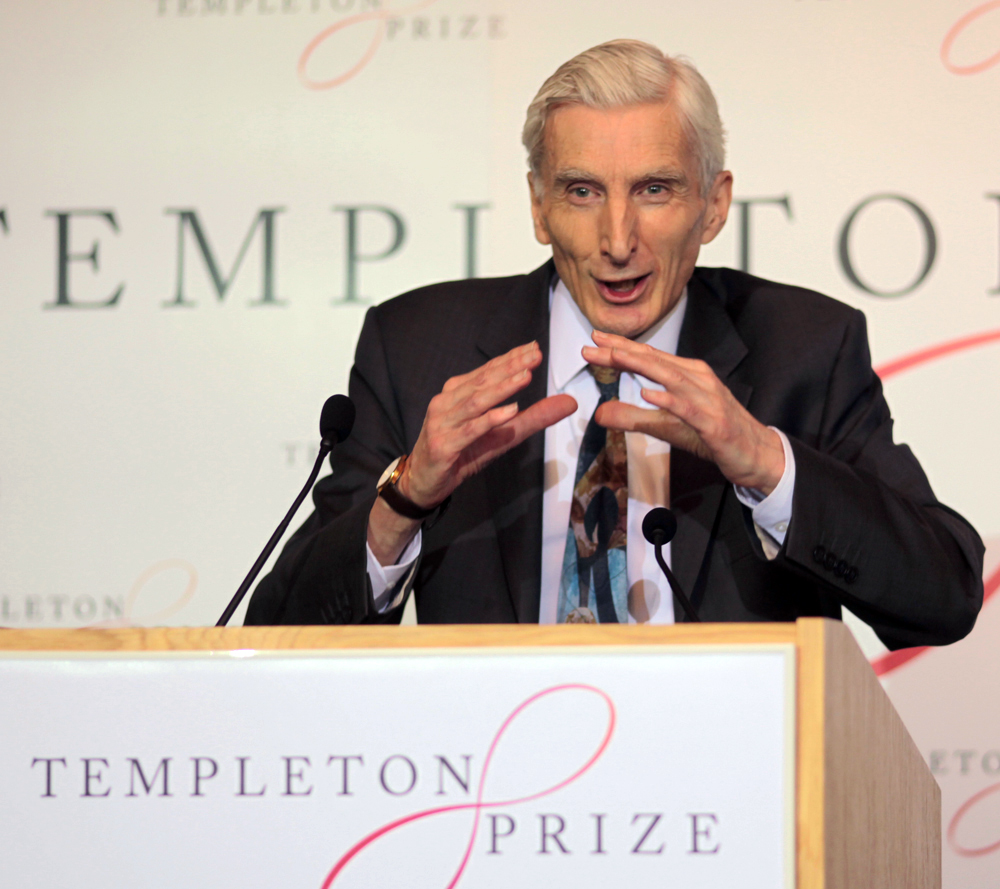
This piece, more or less, has just gone up at the Guardian’s Cif belief. I predict a riot.
Richard Dawkins – author of The God Delusion and theorist of the selfish gene – could claim to be the most famous scientist in Briton. Lord Martin Rees – Astronomer Royal, former President of the Royal Society, Master of Trinity College, Cambridge – is arguably the most distinguished.
Last year, Dawkins published an ugly outburst against the softly spoken astronomer, calling him a ‘compliant Quisling’ because of his views on religion. And now, Rees has seemingly hit back. He has accepted the 2011 Templeton Prize, awarded for making an exceptional contribution to investigating life’s spiritual dimension. It is worth an incongruous $1 million.
Dawkins is no stranger to pungent rhetoric when it comes to religion. But ‘Quisling’ is strong even by his standards. It was originally hurled against fascist collaborators during the Second World War. Martin Rees, a collaborator? What was the crime that warranted such approbation?
The Royal Society, of which Rees was head, lent its prestige to the Templeton Foundation by hosting events sponsored by the fund, which supports a variety of projects investigating the science of wellbeing and faith. The irony, though, is that Rees almost agrees with Dawkins about the links between science and religion. There is little common ground between them, he affirms, because whereas science is about empirical testing and rigorous verification, religious beliefs are speculative and unprovable. If science is about “how”, religion is about “why”. Science seeks facts, whereas religion conveys meaning.
But if they broadly agree on the content of the debate between science and religion, they differ markedly on the tone with which the debate should be conducted. Dawkins is a so-called ‘militant atheist’. He devotes his talents and resources to expelling faith from the public sphere. Rees, on the other hand, though an atheist, values the cultural riches sustained by the church and other faith traditions. He confesses a liking for choral evensong in the chapel of Trinity College. It seems a modest indulgence. The ethereal voices of rehearsing choristers can literally be heard from his front door. But for Dawkins this makes the man a “fervent believer in belief”. And that is a foul betrayal of science.
Rees responded publicly to Dawkins when he gave the Reith Lectures last year, the prestigious series of talks broadcast by the BBC. He said he was happy to be regarded as an “accommodationist” and went on to conclude his lectures with an encomium to Ely Cathedral, the medieval church that soars over the Fens just outside of Cambridge. Its builders lived harsh lives and had limited technology at their disposal, Rees reflected. And yet, their achievement is astonishing. “Their legacy still elevates our spirits, nearly a millennium later.” Will future generations say the same of us today?
To Dawkins a cathedral is presumably a temple to superstition, a monument to a pitiful delusion.
I should declare an interest here, as I would be what Dawkins calls an accommodationist too. I write about the relationship between science and religion, and have been a Templeton Cambridge Journalism Fellow, the beneficiary of a first-rate seminar programme organised by Cambridge academics, funded by the Templeton Foundation. But then I love the big questions.
Rees pursues them too, through cosmology, a subject that clearly fascinates many. Is there life like ours on other planets? What is the nature of our connectedness with the stars? It is for his insights on such matters that he has won the prize. But if he is modest about what can be achieved for religious belief by science, he insists that scientists should not stray into theological territory that they don’t understand too.
Last year, when his fellow cosmologist, Stephen Hawking, declared in a new book that philosophy is dead, because physics is triumphant, Rees advised readers not to take too much notice. “I know Stephen Hawking well enough to know that he has read very little philosophy and even less theology,” he said.
Several other winners of the prize work in the same field, individuals including Paul Davies, Freeman Dyson, John Barrow and John Polkinghorne. Interestingly, past winners display very different attitudes towards faith. If Rees is an atheist, John Polkinghorne is a Christian, witnessed to by the fact that he is also an Anglican priest. Paul Davies is not, though he believes it is perfectly valid to pursue questions of meaning in the context of what is being discovered about the cosmos. After all, is it not remarkable that our universe has produced entities within it that ask such questions – namely ourselves?
The resources of the Templeton Foundation have, in effect, been welcomed by the heart of the British scientific establishment. That such a highly regarded figure has accepted its premier prize will make it that little bit harder for Dawkins to sustain respect for his crusade against religion. When the cultural history of our times comes to be written, Templeton 2011 could come to be seen as marking a turning point in the ‘god wars’. The power of voices like that of Dawkins, Christopher Hitchens and Sam Harris may have peaked and now be on the wane. Science could be said, in effect, to have rejected their advocacy and attitude. They’ve overplayed their hand.